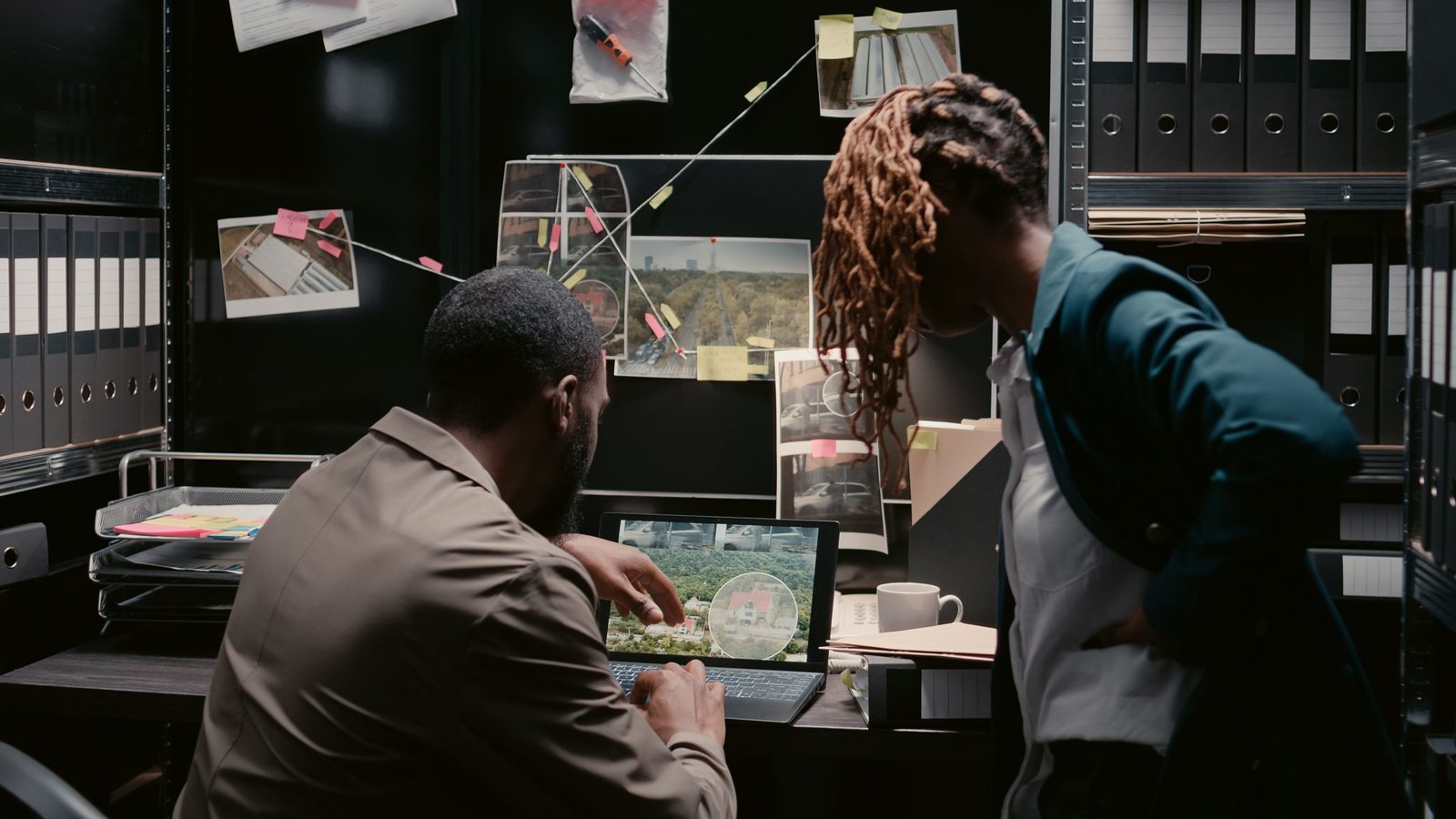Private Investigator vs. Detectives
Bellevue, United States - May 29, 2023 / Viking Protective Services LLC /
Private Investigator vs. Detective
Private investigators and detectives are professionals who conduct investigations, but there are differences between the two. The title “detective” is often used in the public sector, where police officers work in a law enforcement agency, while “private investigator” is used in the private sector. Both private investigators and detectives can specialize in various types of investigations, such as criminal or corporate investigations. Pursuing a career as a detective may bring to mind the fictional character Sherlock Holmes, but real-life detectives and private investigators use similar skills to solve cases.
What is a Private Investigator?
A private investigator (PI) is a professional working in the private sector to gather client information. Private investigators may work for individuals, law firms, corporations, insurance companies, or government agencies. They may investigate fraud, theft, missing persons, or infidelity cases. Private investigators are like sherlock holmes, who work outside the criminal justice system. However, they may collaborate with police officers as needed.
Private investigators, law enforcement detectives, and police officers have various tools to conduct their investigations, including surveillance equipment and forensic technology. PIs and other professionals may also conduct interviews in their investigation process. Law enforcement agencies often collaborate with private investigators to gather evidence and solve cases.
What is a Detective?

A detective, also known as a criminal investigator, is a law enforcement professional who works for a police department or other government agency to investigate crimes within their jurisdiction. Detectives may specialize in specific areas, such as homicide investigation or narcotics investigation, and their job is an essential part of the criminal justice system.
Detectives, typically police officers, can access resources unavailable to private investigators (PIs), such as databases containing criminal records and other sensitive information. They also have the authority to make arrests and carry firearms, making it a highly sought-after career in justice. However, PIs can still play a valuable role in investigations requiring their unique skill set and expertise.
Understanding the Difference Between Private Investigators and Detectives
Different Legal Authorities: Private Investigator vs. Detective
Private investigators and detectives are two professions that are often used interchangeably, but they have distinct differences. One of the most significant differences between the two is their legal authority. Detectives work for law enforcement agencies as police officers and have the power to make arrests, carry firearms, and conduct investigations on behalf of the criminal justice system. In contrast, private investigators or PIs do not have these same legal authorities but still play a crucial role in investigating cases daily.
While private investigators (PIs) can gather evidence and conduct investigations on behalf of individuals or organizations, they cannot make arrests or carry firearms. Their scope of work is generally limited to civil cases such as divorce proceedings, child custody disputes, or insurance fraud claims. However, PIs may work alongside law enforcement detectives and police officers in criminal justice cases.
Hired by Individuals vs. Law Enforcement Agencies
Another difference between private investigators and detectives is who hires them. Private investigators, or PIs, are typically employed by individuals or organizations looking to gather information about a particular person or situation. For example, a spouse may hire a private investigator to gather evidence of infidelity in a divorce case. On the other hand, police officers and detectives are employed by the criminal justice system to investigate and solve crimes.
On the other hand, criminal investigators, often police officers, work for law enforcement agencies and investigate crimes such as thefts, homicides, and drug offenses. They often work closely with prosecutors to build cases against suspects and present evidence in court.
Scope of Work: Civil Cases vs. Criminal Cases
The scope of work for private investigators is generally limited to civil cases, while detectives, who are police officers, handle criminal cases. Private investigators specialize in specific areas such as surveillance, background checks, or skip tracing, which helps locate people who have gone missing or owe money.
In contrast, criminal investigators, such as police officers, investigate crimes such as burglaries or assaults that involve violence against people or property damage. They also collect evidence from crime scenes, like fingerprints which can be used in court proceedings.
The Benefits of Hiring a Private Investigator Over a Detective
More comprehensive Range of Services Offered by Private Investigators
Private investigators offer a more comprehensive range of services than detectives. While detectives may specialize in criminal investigations, private investigators can assist with various cases, including infidelity investigations, background checks, and corporate investigations. Private investigators have the experience and expertise to handle complex issues that require specialized knowledge and skills. Police officers may also benefit from the services of private investigators.
One benefit of hiring a private investigator is their ability to gather evidence that can be used in court. Private investigators are trained to conduct thorough investigations and collect evidence admissible in court. They know how to obtain information legally without violating anyone’s rights or breaking any laws. Additionally, private investigators can work alongside police officers to provide additional support and assistance in criminal cases.
Another advantage of working with a private investigator is their ability to work discreetly. Unlike detectives who may be associated with law enforcement agencies, private investigators work independently and can maintain confidentiality better than detectives. This level of discretion is fundamental when conducting sensitive investigations such as infidelity or corporate espionage cases.
More comprehensive Range of Services Offered by Private Investigators
Private investigators provide more personalized attention to clients compared to detectives. They take the time to understand their client’s needs and tailor their investigation approach accordingly. This level of personalization ensures that clients receive the best possible service for their specific case.
Private investigators also keep their clients informed throughout the investigation process. They provide regular updates on the progress of the investigation and communicate any new developments or findings promptly. This level of communication helps clients feel more involved in the investigation process and gives them peace of mind knowing they are being kept up-to-date on all aspects of their case.
Why Do Private Investigators Need a License?
In most states, private investigators must hold a license to operate legally. The licensing requirements vary from state to state but generally involve completing training courses, passing an exam, and meeting specific experience requirements.
The purpose of licensing requirements is to ensure that only qualified individuals are allowed to operate as private investigators. Licensing helps protect consumers from unscrupulous individuals who may not have the necessary skills or experience to conduct investigations properly.
Experience and Training Requirements for Private Investigators and Detectives
Police Officers to Detectives
Becoming a police detective is a career goal for many law enforcement professionals, including criminal investigators. However, it’s not an easy feat to achieve. Police officers can become detectives by meeting specific requirements their law enforcement agency sets. These requirements typically include having a certain amount of experience as an officer, completing additional training in investigation techniques, and passing a written exam.
To be considered for the role of detective, officers must have several years of experience working as a patrol officer. This is because detectives are responsible for investigating crimes that require more specialized knowledge than what is necessary of patrol officers. As such, they need to understand criminal laws and procedures thoroughly.
In addition, to experience, officers and criminal investigators looking to become detectives must complete additional training in investigation techniques. This training may cover evidence collection and preservation, surveillance techniques, interviewing witnesses and suspects, and crime scene analysis.
Private Investigators Qualifications
Private investigators need to have a background in criminal justice, education, or law enforcement to qualify for jobs in the field. Unlike police detectives for law enforcement agencies, private investigators work independently or for private investigation firms.
Becoming a private investigator requires obtaining proper licensing through the state where you plan to practice your profession. The qualifications vary from state to state but usually include being at least 18 years old with no prior convictions or felonies on your record. Criminal investigators may also consider pursuing this career path.
A degree in criminal justice or related fields can help increase your chances of landing a job as a private investigator since most employers prefer candidates with formal education. Previous experience working in law enforcement can also be beneficial when pursuing this career path.
What Do Police Detectives Do? Comparing Their Responsibilities to Private
Police detectives are law enforcement officers who work for police departments. They play a vital role in solving crimes and upholding the law. Unlike private investigators, police detectives have the authority to make arrests and carry firearms. This section will discuss what police detectives do and compare their responsibilities to private investigators.
Investigating Crimes
One of the primary roles of a police detective is to investigate crimes. They gather evidence, interview witnesses, and analyze information to help solve cases. Detectives work closely with other law enforcement officials, including forensic specialists and patrol officers.
Gathering Evidence
Detectives are responsible for collecting evidence at crime scenes. This can include fingerprints, DNA samples, and other physical evidence that could help identify suspects or link them to the crime.
Interviewing Witnesses
Detectives also interview witnesses who may have seen or heard something related to the crime. They use their interviewing skills to extract valuable information that could help solve the case.
Making Arrests
Unlike private investigators, police detectives have the authority to make arrests. They can take that person into custody if they believe they have enough evidence to charge someone with a crime.
Protecting the Public
The ultimate goal of police and private detectives is to uphold the law and protect the public. Their job is critical in maintaining safety within communities by preventing crimes from happening or solving them when they occur.
Private Investigators’ Responsibilities
Individuals or organizations hire private investigators to gather information or conduct surveillance on specific people or situations. Their clients may include lawyers, insurance companies, businesses, or individuals seeking assistance with personal matters such as infidelity investigations.
Gathering Information
Private investigators collect information through various means, such as conducting background checks on individuals or reviewing the financial records of businesses. They also use surveillance techniques like following people discreetly or monitoring their online activities.
Conducting Interviews
Like police detectives, private investigators interview potential witnesses who can provide helpful information about a case.
Reporting Findings
Private investigators report their findings to their clients. They may provide photographic or video evidence, written reports, or verbal summaries of their investigations.
Conclusion: Choosing Between a Private Investigator and a Detective
Choosing Between a Private Investigator and a Detective
The choice between a private investigator or a detective can be confusing. Both professions have similar job descriptions, but some key differences set them apart.
Private investigators typically work for individuals or businesses and focus on gathering evidence related to personal matters such as infidelity, child custody cases, or insurance fraud. On the other hand, detectives work for law enforcement agencies and investigate crimes such as homicide, robbery, and drug trafficking.
While both professions require extensive training and experience in investigative techniques, private investigators have more flexibility in their methods of investigation since they are not bound by the same legal restrictions as police detectives. Private investigators can use surveillance equipment such as hidden cameras and GPS trackers without a warrant.
Another benefit of hiring a private investigator is their ability to provide personalized attention to your case. Unlike detectives who may be juggling multiple investigations at once, private investigators often take on fewer cases to dedicate more time and resources to each client.
However, it’s important to note that while private investigators may seem like the cheaper option upfront, their services can quickly add up depending on the complexity of your case. In contrast, police detectives are salaried employees who do not charge for their services.
Hiring a private investigator or detective will ultimately depend on your specific needs and circumstances. If you require assistance with personal matters such as infidelity or child custody cases, a private investigator may be better suited. However, if you need help with criminal investigations or suspect illegal activity within your business or organization, hiring a detective would be the best course of action.

Contact Information:
Viking Protective Services LLC
14205 SE 36th Street, Suite 100 | Bellevue, WA | 98006
Bellevue, WA 98006
United States
Viking Protective Services LLC
(206) 822-1518
https://vikingprotectiveservices.com/


